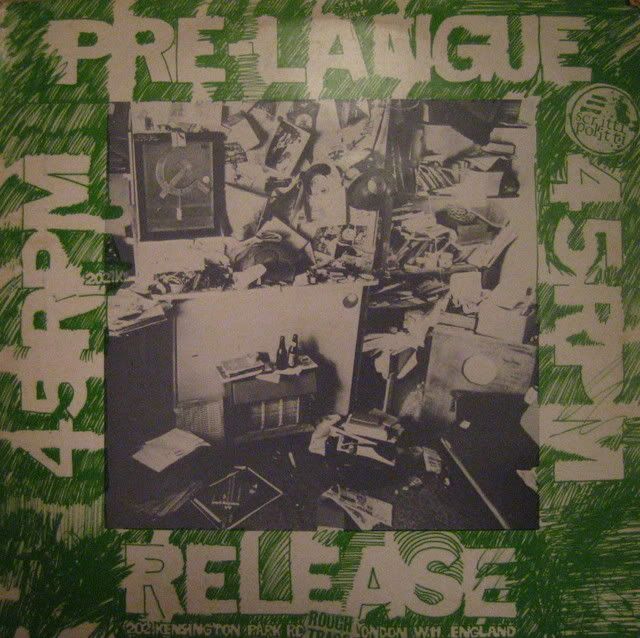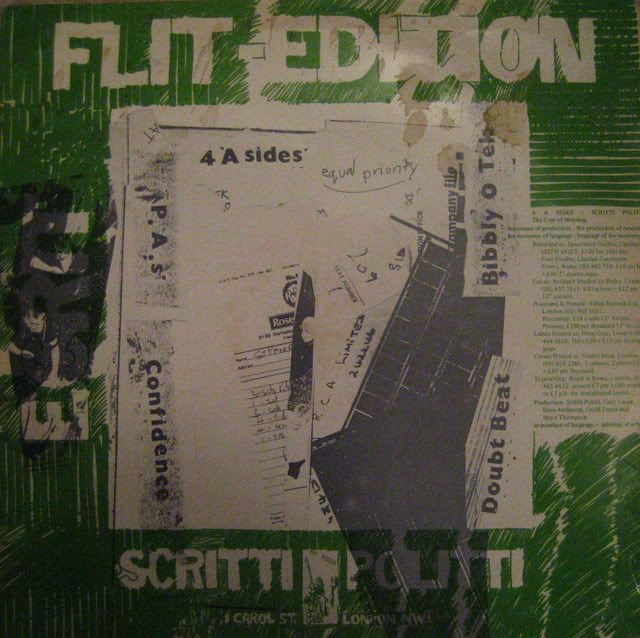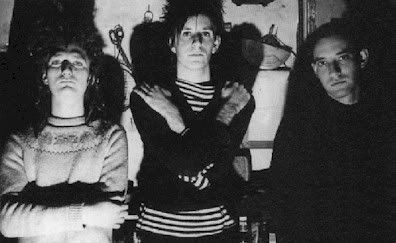


Confidence / P.A.s
Bibbly O Tek / Doubt Beat
Great third release by Scritti Politti on a Rough Trade and St Pancras Records split release, quickly following on from ‘Skank Bloc Bologna’ and the ‘Peel Session’ 7″singles from 1978.
The band at this time were submerged in the North London (Mornington Crescent / Camden area) squatting scene, were dabbling with Communist theories and were partial to a nice bit of grade A Dub and Reggae. The band’s communal lifestyle, added to the mixture of influences, certainly gave them the edge when creating great slabs of music.
Simon Reynolds piece on Scritti Politti first published in The Wire 2001

How do pop groups choose their fans? Like any romance, it’s a subtle, near-imperceptible process of sifting through the general population, a trail of lures and signals. I’m still not sure what it was that seduced me into a long infatuation with Scritti Politti: the sound or the idea of the band. Back in 1979, the two were inseparable, of course. The urgency’s of the post-punk era made the notion of music-for-music’s sake seem decadent, trivial, absurd. And some of the best groups were more influential as concepts than fully-realized propositions. What grabbed my ear first was the name, I think. Just the sound of it: Scritti Politti, brittle and chiming like the guitar-sound on “Bibbly O Tek” (first Scritti song I ever heard, John Peel, late 1979). That, and the sheer intrigue of what it might refer to. Eventually I discovered that it was a slight corruption of the title of a book by neo-Marxist thinker Antonio Gramsci. Which only enhanced the image I’d already gleaned from the music press of this shadowy collective operating at some fabulously uncompromising and far-reaching outer-limit of politics-and-pop. If even Paul Morley, reviewing two of their singles together for NME, found them faintly forbidding… well, count me in! If I’m really honest, though, I think it was a photo that sealed the deal: Green, dragging on a cigarette, thin as a rail inside his baggy jumper. Clearly teetering on the edge of his nerves, with what looked like kohl darkly etched around his fragile, blazing eyes, he seemed the incarnation of intensity–all the glamour of a life harrowed by thought. There was another figure in the photograph (or was it another pic altogether?), a white guy with blonde dreadlocks: back then, this was quite a striking fashion statement (nowadays, it just signifies “nu metal, yuk!”).
The 4-A Sides EP was the first Scritti release I actually got hold of: a 12 inch single (exotic in 1979!….at least if you lived in a Hertfordshire commuter town), with typography that mimicked a reggae pre-release (except Scritti wrote ‘Pre-Langue’, a pre-echo of Green’s soon-come Derridean preoccupation with language). On the front, another intriguing photo: Scritti’s communal squat in Mornington Crescent. A framed hammer-and-sickle above the mantelpiece harked back to Green’s past as a Young Communist, although somebody sacrilegiously hung what’s looks like a teabag or tampon off the sickle. The place is a tip: empty beer bottles, typewriter with a tower of books piled on top, 7 inch single nailed to a wall densely covered with flyers, broad-sheets, activist pamphlets. On the back cover, Scritti include a breakdown of the EP’s recording costs, plus phone numbers for label printers, pressing plants, etc: demystification of the means of production, designed to encourage/enable others to do-it-themselves.
Green later loudly disowned the music of 4-A-Sides and the two other “early Scritti” releases, but I still find it thrilling. “Skank Bloc Bologna”, the debut single, is a desolate, desperate ballad for exiles on the High Streets of Babylon U.K, its loping punky-reggae riddem overlaid with a clangour of close-chord-ed guitar and pierced by plangent carillon lead-runs that some sages claim are steeped in the influence of Martin Carthy-era Steeleye Span!
I found the song title wonderfully mysterious and evocative. Now, knowing more about the period, I wonder if it was some kind of “answer” to ATV’s “Alternatives To NATO”: an imaginary network of dissidents stretching from Jamaica to Bologna’s anarchist squatters, via Ladbroke Grove (the singles second B-Side, the frantic instrumental “28/8/78”, is overlaid with a TV news report on that year’s rioting at the Notting Hill Carnival).
4-A Sides is first-phase Scritti at their peak. There’s palpable joy and fervor in the playing. The rhythm section, Tom Morley (the guy with natty dreads) and Niall Jinks, provide the “optimism of the will” to counter the lyrics “pessimism of the intellect”. Niall’s bass, squirming and writhing, is simultaneously the music’s funk motor and melodic focus. And Green’s minor-key twists and multi-tracked vocal babble can’t hide his gifts as singer and tune-smith. The words, oscillating line-by-line between theoretical abstraction and the concrete quotidian details of everyday oppression, are as far beyond Gang of Four’s schematic case studies of false consciousness as Go4 were an advance on Tom Robinson’s tell-it-like-it-is protest. “P.A.’s”, for instance, moves back and forth between the band’s struggle to exist (rehearsal costs, debts, bailiffs) and fascism in 1920 and 1933: the mystery of popular support for totalitarianism, all its daft pageantry and atavistic ritual. “How/Did they all decide?”, wonders Green. “What was irrational/Is national!”, before imagining, with tres 1979 paranoia, the same thing happening here in England, the land of “all things in moderation”.”The language has shut down”, goes one line in “P.A.s”: Scritti were poised on the cusp between Gramsci’s notion of “hegemony” (“common sense” as the ideological sleight by which the ruling class makes the-way-things-are seem natural, ordained, the only possible reality) and a post-structuralist conception of language itself as the conductive fluid for power. On the sleeve of the Peel Sessions 7 inch EP, a page from the imaginary book Scritto’s Republic explores these ideas: grammar as the means by which the unformed self is constituted as a subject. The songs themselves seem like a regression to a less sophisticated approach to lyrics, though: “Messthetics”, “Hegemony,” and “Scritlocks Door” are party political broadcasts, mini-manifestos of anti-rockism. Only the unsettling “OPEC Immac” builds on the lateral thinking and uncanny connections of “PA’s” and “Bibbly O’ Tek”. Green’s voice, distraught and frayed-sounding, suggests he’s on the verge of a theory-and-stimulants induced breakdown. Which, by all accounts, he was.

![]()


Nic
February 26, 2010 at 4:16 pmGreat (and inspirational) record…
jon (ex-from bromley)
March 4, 2010 at 7:54 pmi absolutely love this record… one of my favourite RT releases. now available on the ‘Early’ CD of all their RT releases up to Sweetest Girl and including Skank Bloc Bologna… wonderul stuff and still as good now…